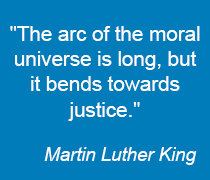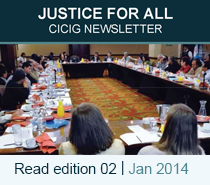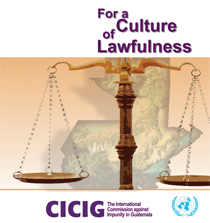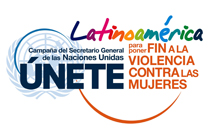|
Statement by Commissioner Carlos Castresana as Guest of Honour during the presentation of Guatemala Visible, (www.guatemalavisible.org) a collective effort promoted by Rafael Landívar University that has become a working tool for all of the people and institutions that want to participate in the process of monitoring the work of the Nominating Committees that will nominate the candidates for the Supreme Court of Justice and the Appellate Courts.
The corrupt are equal to vampires: they live by sucking other people's blood and light destroys them. Light and transparency are their obstacles.
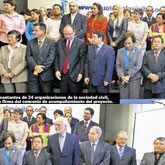 In every society that respects the rule of law, the three branches of government have to respond to a democratic legitimacy. In reference to the Legislature and the Executive, they emanate from a direct electoral process. Presidents, Vice Presidents and members of Congress are elected by the citizens. This same democratic legitimacy should also apply to the Judiciary, since it is in charge of resolving conflicts in the heart of human societies. However, given the technical and professional nature of its members, they are not usually the object of direct elections by the citizens. In every society that respects the rule of law, the three branches of government have to respond to a democratic legitimacy. In reference to the Legislature and the Executive, they emanate from a direct electoral process. Presidents, Vice Presidents and members of Congress are elected by the citizens. This same democratic legitimacy should also apply to the Judiciary, since it is in charge of resolving conflicts in the heart of human societies. However, given the technical and professional nature of its members, they are not usually the object of direct elections by the citizens.
But it is necessary that there exist representative and transparent procedures that guarantee to society that members of the Judiciary have democratic legitimacy.
The election of judges should respond to fundamental democratic principles. The selection process must be transparent and public and abide by the principle of legality that requires that judges strictly exercise their individual functions at will of the people; in other words, utilizing legislative procedures to enforce the law and not to impose their will, and that they do this with total independence and impartiality.
The opposite would happen if Nominating Committees were allowed to make decisions through secret vote or if candidates were permitted to decide which of their personal data may or may not be made public.
This civil society initiative, which we celebrate today, is a true reflection of the fact that Guatemalan society is taking responsibility to participate in the election of one of the three State powers. In this case, Guatemala is on the path to democracy, since it is ensuring transparency, citizen participation and information.
Many months ago, the Commission asked Guatemalan society to get involved, to organize, to take the reins of its own destiny. Today, we simply have to give our thanks to the citizens of Guatemalan, because that is what they are doing.
Words of Commissioner Carlos Castresana
|


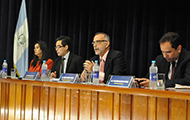
 In every society that respects the rule of law, the three branches of government have to respond to a democratic legitimacy. In reference to the Legislature and the Executive, they emanate from a direct electoral process. Presidents, Vice Presidents and members of Congress are elected by the citizens. This same democratic legitimacy should also apply to the Judiciary, since it is in charge of resolving conflicts in the heart of human societies. However, given the technical and professional nature of its members, they are not usually the object of direct elections by the citizens.
In every society that respects the rule of law, the three branches of government have to respond to a democratic legitimacy. In reference to the Legislature and the Executive, they emanate from a direct electoral process. Presidents, Vice Presidents and members of Congress are elected by the citizens. This same democratic legitimacy should also apply to the Judiciary, since it is in charge of resolving conflicts in the heart of human societies. However, given the technical and professional nature of its members, they are not usually the object of direct elections by the citizens.